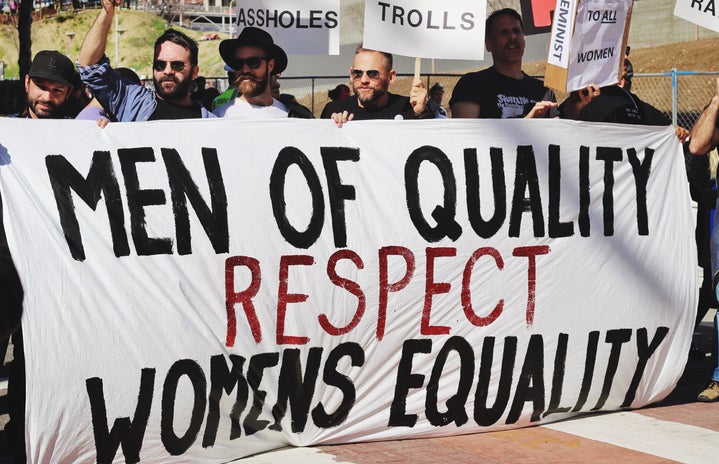Stonehill College is known for many things: an abundance of purple, sledding tracks down the hill in front of Donahue, gorgeous buildings, and much more. But if you ask around campus, most people will tell you that the most unique aspect of Stonehill is the door-holding culture. Skyhawks will hold doors for others who may be several yards away, regardless of who they are. This facet of our identity makes campus feel welcoming to new students, and familiar to alumni. I couldn’t count the number of times professors have brought it up in my classes. However, this performative gesture is met with an equally pervasive but lesser-known counterpart; taking up space on sidewalks.
A common assignment in GND 101: Introduction to Gender and Sexuality is a paper that asks students to change an aspect of the way they embody their gender. Each course, a handful of students will choose to take up more physical space on campus, as opposed to being “polite” and making as much space for others as possible, as women are often implicitly expected to do. These students subsequently encounter the sidewalk problem; male students at Stonehill generally do not move to accommodate others passing them on sidewalks. Women must then trek through puddles, snowbanks, or leave the sidewalk entirely in order to avoid a collision with the oncoming male students. Female students who choose not to move, as men choose to do each day, are then run into by the male students they pass. Students have reported this to be a jarring experience where they are made to feel invisible and disrespected. Recent Stonehill graduate Emma-Cate Rapose has experienced this situation firsthand; “Men kind of just expect women to step out of the way when they’re walking, which kind of reinforces the entire idea of the patriarchy.There were a few times when I almost physically walked into someone because they didn’t want to move.”
As Rapose points out, men feeling more entitled to physical space is a learned mindset that is indicative of who is legible as possessing power in the United States. Namely, men are encouraged from childhood to assert themselves and claim space of their own, while women are taught to make space for others, regardless of what is left for them. Taking up space is one of many aspects of patriarchy, a sociopolitical construct that touches every part of our nation, and teaches that “masculine” qualities, such as assertiveness, strength, hypersexuality, ambition, and more are inherently superior to feminine ones, therefore, men are superior to women. Patriarchy takes many forms and can manifest in violent interactions or subtle displays, such as consistently assuming women will move over for men on sidewalks. Students are not the only ones to experience this phenomenon; female faculty and staff have also been run into by male students, sending the message that they aren’t respected by some of the male population at Stonehill.
How do we grapple with these two behaviors on our campus? I think the answer lies in how we view each other and ourselves. Holding a door is an active performative gesture that we are encouraged to do each day by watching those around us. It is a part of Stonehill’s identity, and something we learn to do as we adjust to life on campus. Holding a door is a nice thing to do. But niceness doesn’t always reflect an individual’s values of respect or morality. Niceness, I would argue, is what we do when people are looking. Kindness is a moral and ethical commitment to equity, to making the lives of those around us better in any way we can. So yes, holding doors is nice. But showing others that we value them as people through giving space on sidewalks is kind. It is a small gesture that shows a man, or any person, values and respects the woman passing him as an equal being.



